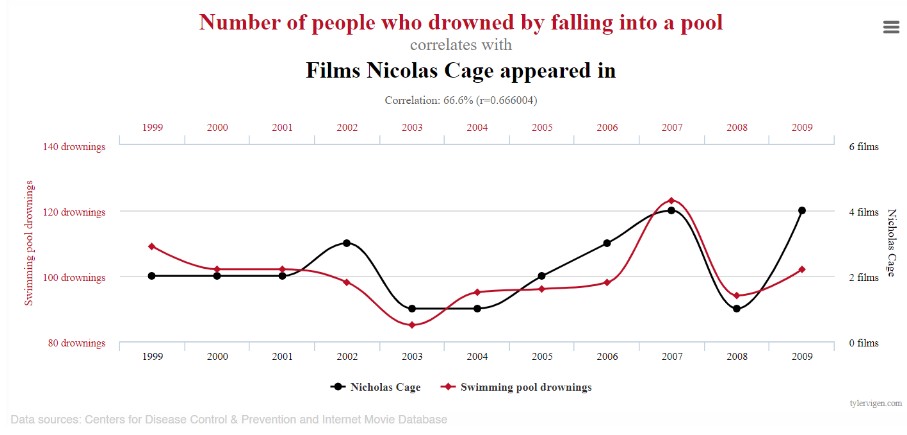It seems that one can no longer see the word “insights” without it being prefixed by “actionable”. As I was typing this, Google tried to complete my last sentence by adding “insights'' after “actionable”. Just as it is no longer possible to read “PC” without “gone mad”, so it appears that non-actionable insights are no longer a thing.
What does this actually mean, though? Supposedly an actionable insight is a conclusion “drawn from data that can be turned directly into an action or a response.” (Techtarget) Really? I’d be very wary of actions carried out directly in response to data only. Surely it’s wiser to plan your actions based on your judgement of the implications of information.
It may sound like I’m splitting hairs, but bear with me. Consider the following: according to Tyler Vigen’s Spurious Correlations site, between 1999 and 2009, the number of people who drowned by falling into a pool is highly correlated with the number of films in which Nicholas Cage starred. Data doesn’t lie, right? What’s the actionable insight here, that if Nick has a busy schedule next year we should invest in water wings, or that clearly Mr. Cage has a dark fetish?

Data is dumb. It doesn’t “know” anything and has no insights to reveal. We humans derive insights from a mixture of data (as we have perceived it), context, experience, bias, emotion and many other inputs. These are all subjective, and so are insights. Where you see high volume because of a brilliant sales team, I see an underpriced product, or rampant discounting, or bribery, or hidden motivators, or dumb luck, or - maybe - a brilliant sales team. To be more confident about the insights we derive from data, we need to shift our frame of reference and do more analysis. We may need more data.
Making decisions is an imperfect craft. Business decisions are bets whose odds vary - sometimes it’s bleeding obvious what needs to be done (probably), and other times we have to act on ‘gut feel’ (making data-led decisions without conscious awareness of the inputs). Doing this well involves blending many inputs from many sources and sometimes very different perspectives.
This is why I don’t like the term “actionable insight”, because it suggests a one-to-one relationship between a data-led insight and an action. This notion is common in the product management world, in which A/B testing encourages product managers to make tactical product decisions on the basis of a single measurement. It’s a recipe for aimless, tactical tweaking as a result of overly focusing on isolated observations.
In my experience the best actions arise from consideration of many insights, and so there isn’t any one actionable insight. Mostly, they’re not directly actionable, but they do contribute to your overall understanding, from which you make decisions. You wouldn’t “thank the data” if you made a good business call, and neither can you hide behind “what the data said” if it went wrong. Ultimately there is subjective judgement in business decisions, because none of us knows the future. We may get it right or guess wrong, but so long as we learn from our decisions, that’s all that can be expected.
Share
